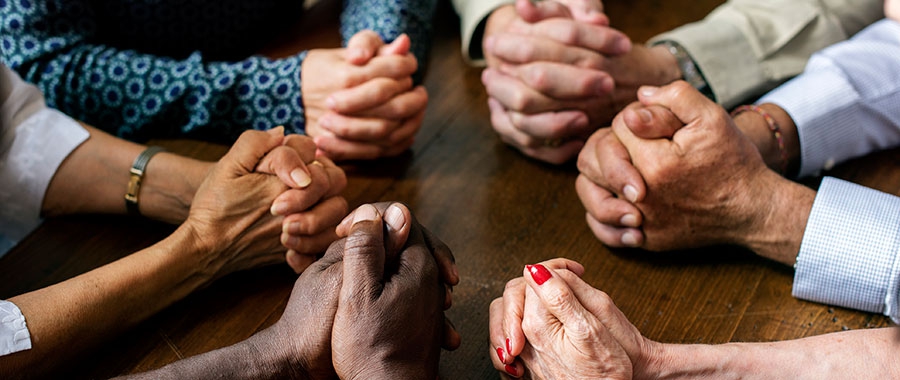The views expressed in our content reflect individual perspectives and do not represent the authoritative views of the Baha'i Faith.
All around the world, neighbors, families and groups of friends gather in different spaces to pray together—regardless of their religion, race, nationality or background.
In the global Baha’i community, we’re beginning to see how these gatherings can gradually change the way we perceive ourselves and the community around us.
These kinds of informal prayer gatherings, sometimes called devotionals, represent one of the main efforts of the Baha’i community when it comes to creating a new culture of love and unity. The Baha’i holy writings clearly extol the power of prayer, especially when people come together in groups to pray:
Gather ye together with the utmost joy and fellowship and recite the verses revealed by the merciful Lord. By so doing the doors to true knowledge will be opened to your inner beings, and ye will then feel your souls endowed with steadfastness and your hearts filled with radiant joy. – Baha’u’llah, from a tablet to an individual Baha’i.
Praying on our own drives our personal development, of course, but while today’s world tends to consider praying a very private matter, Baha’u’llah’s words point to prayer as an important societal force.
The devotionals Baha’is organize around the world might look very different depending on where the participants live, but at their core, they share the same essential elements: friends gather in a spiritual atmosphere, share prayers and read holy writings from all Faiths together. Some devotionals include singing, or a discussion of spiritual topics following the prayers; others might decorate the space with flowers or candles, or not decorate at all; and some may have a set program, while others encourage more spontaneity.
But no matter where or how a devotional takes place, it can have an undeniably powerful influence on its surroundings and its participants. Baha’is around the world, alongside their friends, have seen the effects that organizing and participating in devotional gatherings have on a community.
Shamim Azimi, a university student from Sydney, Australia, shared his experience organizing prayer gatherings in his community, which include a space for the discussion of spiritual topics. Those attending tend to be youth between 14 years of age and their late twenties—an age range that he says “really helps [add] fresh insights and learnings to the discussions.”
Their devotional has become a place where teens can consult older youth for advice, especially about education and career choices. “Just last night,” Shamim said, “while the deepening [discussion of spiritual topics] was happening, in the other room a couple of the students were working on assignments they had due, and a few of the other youth went and helped them out.”
Few spaces exist where middle-schoolers and university graduates can mingle in a trusting, unified and encouraging way. These devotional gatherings create an important, integrated way for friends of all ages to share insights and support each other in life, united by the lofty purpose of connecting with a higher power:
Set your faces towards unity, and let the radiance of its light shine upon you. Gather ye together, and for the sake of God resolve to root out whatever is the source of contention amongst you. Then will the effulgence of the world’s great Luminary envelop the whole earth, and its inhabitants become the citizens of one city, and the occupants of one and the same throne. … There can be no doubt whatever that the peoples of the world, of whatever race or religion, derive their inspiration from one heavenly Source, and are the subjects of one God. … Cleave unto that which draweth you together and uniteth you. – Baha’u’llah, Gleanings from the Writings of Baha’u’llah, p. 217.
Religious divisions also—perhaps surprisingly—begin to blur in a devotional space. Baha’i prayer gatherings encourage friends of all backgrounds to bring their own sacred writings, or share anything that inspires their souls. This results in a wonderful diversity of experiences in devotionals throughout the world—one that really does feel inclusive.
Some years back, Rasa Aliukonyte, a young mother, held her first-ever devotional gathering in her home in Lithuania. Her willingness to make the space one that brought friends of all backgrounds together managed to cut through her society’s traditional custom of not inviting large groups of people to one’s house. As participants sat in a circle, most strangers to each other, a certain nervousness became apparent to Rasa, which she attributed to reading something as personal as one’s holy writings in the presence of a group.
But as some began to read prayers, a spirit of comfort enveloped those who had gathered. When prayers and quotes had been read throughout the circle, it seemed that the devotional was over. But then a new voice rose up, chanting a song: it was a woman who knew no one besides the host, singing a Christian prayer so soulfully it moved everyone.
In Rasa’s city, friends didn’t often ever set foot in each other’s homes, much less share their religious beliefs with others—but this woman felt comfortable enough to sing from the depths of her soul and add to the diversity of religions represented there.
We often keep our spiritual beliefs closed off from society, when interactions mostly occur around material subjects. Prayer gatherings of this sort, though, can help us open our souls to our friends, both old and new, connecting over what matters most.
Once friends overcome the differences they previously thought of as barriers, it quickly becomes evident that we are all the same—and that we are all capable of loving and trusting each other. When we share our aspirations, our fears, and our love for others through prayer, freed from the usual constraints that guide our material relationships, something stronger emerges—something we might not have even known existed within us:
Devotional meetings are occasions where any soul may enter, inhale the heavenly fragrances, experience the sweetness of prayer, meditate upon the Creative Word, be transported on the wings of the spirit, and commune with the one Beloved. Feelings of fellowship and common cause are generated, particularly in the spiritually heightened conversations that naturally occur at such times and through which the “city of the human heart” may be opened. – The Universal House of Justice, 29 December 2015.
















Comments
Sign in or create an account
Continue with Googleor